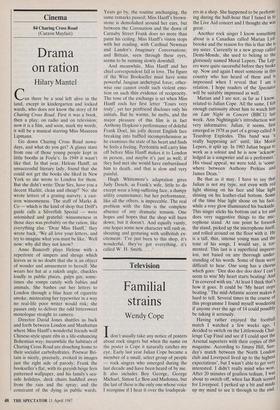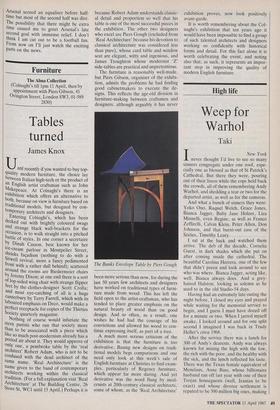Television
Familial strains
Wendy Cope
Idon't usually take any notice of posters about rock singers but when the name on the poster is Cope it naturally catches my eye. Early last year Julian Cope became a member of a small, select group of people — rock singers who emerged during the last decade and have been heard of by me. It also includes Boy George, George Michael, Simon Le Bon and Madonna, but the last of these is the only one whose voice I recognise if I hear it over the loudspeak- ers in a shop. She happened to be perform- ing during the half-hour that I tuned in to the Live Aid concert and I thought she was great.
Another rock singer I know something about is a Canadian called Marian Lyd- brooke and the reason for this is that she is my sister. Currently in a new group called Demi-Monde, she used to belong to the gloriously named Moral Lepers. The Lep- ers were quite successful before they broke up. Now and again I meet someone in this country who has heard of them and Is impressed when I reveal that I am a relation. I hope readers of the Spectator will be suitably impressed as well.
Marian and I are not, as far as I know, related to Julian Cope. All the same, I felt enough curiousity about him to watch him on Late Night in Concert (BBC1) last week. Ann Nightingale's introduction was very informative. Julian, it seems, first emerged in 1978 as part of a group called A Teardrop Explodes. This band was 'a really happening act' until, like Moral Lepers, it split up. In 1983 Julian began to work as a soloist and he is now `acknow: ledged as a songwrier and as a performer. His visual appeal, we were told, is 'some- where between Anthony Perkins and James Dean.'
Be that as it may, I have to say that Julian is not my type, not even with red light shining on his face and blue light shining on his leather-clad bottom. Some of the time blue light shone on his face, while a rosy glow illuminated his backside. This singer sticks his bottom out a lot and does very suggestive things to the mic- rophone stand. At one point he forsook the stand, picked up the microphone itself, and rolled around on the floor with it. He is a tall, thin, intense young man and the tone of his songs, I would say, is tor- mented. This last is a superficial impress- ion, not based on any thorough under- standing of his words. Some of them were difficult to hear. One song has a chorus which goes: 'Dee doo dee doo doo/ I can't seem to win/ My heart starts beating/ And I'm covered with sin.' At least I think that's how it goes. It could be 'My heart stops beating.' The mid-Atlantic accent makes it hard to tell. Several times in the course of this programme I found myself wondering if anyone over the age of 14 could possiblY be taking it seriously. Having rather enjoyed the football match I watched a few weeks ago, I decided to switch on the Littlewoods Chal- lenge Cup Final and see if I could spot the Arsenal suporters with their copies of this magazine. According to Jimmy Hill, Sun- day's match between the North London club and Liverpool lived up to the highest expectations', but I wasn't able to get verY interested. I didn't really mind who won. After 20 minutes of goalless tedium, I was about to switch off, when Ian Rush scored for Liverpool. I perked up a bit and made up my mind to see it through to the end. Arsenal scored an equaliser before half- time but most of the second half was dire. The possibility that there might be extra time caused me to greet Arsenal's late second goal with immense relief. I don't think I am cut out to be a football fan. From now on I'll just watch the exciting parts on the news.

























































 Previous page
Previous page